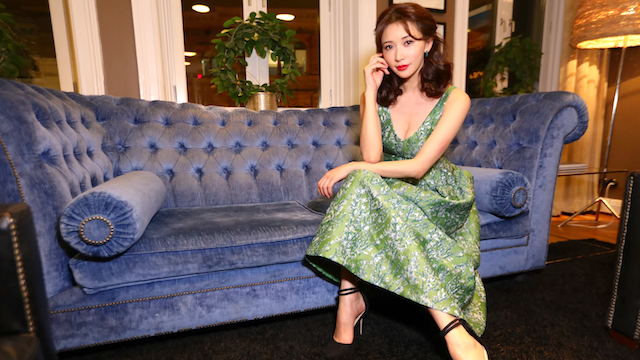The H&M Foundation is seeking a new round of innovators to help entrepreneurs “reinvent the entire fashion industry.
Swedish fast-fashion retailer H&M has contributed a further €1 million into the foundation’s fund and reappointed Taiwanese actress Chiling Lin, who is also a sustainability influencer, to the expert panel overseeing applications for funding new ideas that help reduce waste across the industry.
Intended as a means to speed up the shift from the standard linear fashion model, where clothes often end up in the landfill, to a circular model where materials can be reused or recycled, the Global Change Award was initiated in 2015 by the H&M Foundation, in collaboration with Accenture and the KTH Royal Institute of Technology in Stockholm.
Now the foundation has opened the fourth round of its annual innovation challenge Global Change Award. With more than 8000 entries from 151 countries over three years, it has become the go-to competition for circular innovation and has been described as “the Nobel Prize of fashion”.
“It provides powerful funding and yearlong coaching to innovators who come up with solutions to spark the shift towards a circular fashion industry, protecting the planet and our living conditions,” said an H&M Foundation spokesperson.
Applications for this year’s program close on October 17 – and t year there is a special eye out for ideas embracing digitalisation.
“New ideas are the foundation for change, but scaling them is an enormous challenge for every innovator,” observed Karl-Johan Persson, H&M’s CEO who also sits on the foundation. “Together with our partners Accenture and the KTH Royal Institute of Technology, we’ve seen previous winners cut years off their timeline through our accelerator program. Now, we are eager to welcome five new circular heroes and encourage everyone who wants to reinvent one of the world’s largest industries to apply.”
The Global Change Award sets out to find innovations with the potential to make fashion circular and thereby protect the planet and our living conditions. Other criteria are its impact and scalability, that it is novel and economically sustainable, and that the team is suited to make a difference.
Chiling Lin described it as an honour to be part of the program again this year.
“We need to unite together to protect our planetary earth by contributing ideas and efforts to sustainability,” she said. “The planet needs our care and dedication to safeguard this world and through this meaningful event, we can gather ground-breaking ideas that provide the fashion industry possible solutions to make fashion truly sustainable.”
Current winners’ progress
This year’s Global Change Award winners are currently taking part of the one-year Innovation Accelerator Program, taking them to Stockholm, New York and Hong Kong.
Crop-A-Porter makes sustainable bio-textiles by using leftovers from food crop harvests
Its parent Agraloop received €300,000.
Agraloop is more than one year ahead of its original development schedule and about to begin the optimisation of its Closed-Loop system. Initial patent filings will be developed in the second half of this year at the same time as it runs pilots to produce a prototype Agraloop BioFibre from banana, pineapple, and oil seed hemp. These natural fibres will be processed using their proprietary bio-chemical approach and applied to commercially viable yarns and fabrics. This will go into ground-breaking design collaborations with some of the world’s biggest brands.
The Regenerator aims to recirculate fashion by separating cotton and polyester blends, turning them into new textile fibre. Parent company Swerea IVF received €250,000.
Swerea IVF is focusing on the technical development of its process and how to scale it up, both technically and economically. A new, larger reactor is being installed and will be up and running during later this year. The company is also working on improving the efficiency and yield in the process.
Algae Apparel is turning algae into bio-fibre and eco-friendly dye that is also good for the skin. Parent Algalife received €150,000.
Algalife has received its first Patent Cooperation Treaty (PCT) and is preparing a second. The company has a fully equipped laboratory and is recruiting staff. The production of algae fibres has started in cooperation with German and Swedish institutes, and it is finishing the final formulas for the dye process of each colour, with fabrics from different brands.
Smart Stitch is a dissolvable thread that makes repairing and recycling easy. Parent Resortecs received €150,000.
Resortecs presented its first prototype of dissolvable stitching thread in March, and two months later featured its first fully dismantlable jacket. By July, it had four different solutions meeting all industry requirements and it is currently initiating seven pilots for testing these solutions on products, such as jeans and backpacks.
Fungi Fashion is producing custom-made clothes from decomposable mushroom roots. Parent MycoTex received €150,000.
MycoTex has launched the MycoTex shopper, a bag made from 100 per cent mycelium. The company worked with Utrecht University where it researched how to integrate electronic components in MycoTex, resulting in a light strand covering the bag which responds to a sound; and a chip directing customers to a website with more information. The company is now working on improving the material and testing different dyes. MycoTex was recently named “The modern-day makers” by the World Economic Forum, recognising pioneers which are reviving traditional techniques and developing cutting-edge technologies, or merging the old and the new.






